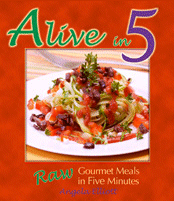The Pros and Cons of Being a Vegetarian: What the Experts Say
by www.SixWise.com
More than 3 percent of U.S. adults are vegetarians, according to a new study, "Vegetarianism in America," by Vegetarian Times. Another 10 percent of adults say they largely follow a vegetarian-inclined diet, while over 5 percent say they are "definitely interested" in following a vegetarian diet in the future.
|

Vegetarians and vegans may live up to 10 years longer than meat-eaters, according to some experts. Others dispel this as a myth.
|
Among the most common reasons for giving up meat (and in a smaller percentage of cases (0.5 percent), all animal products) were health related. Over half (53 percent) of vegetarians said they eat that way to improve their overall health. Other reasons people gave for becoming vegetarian were:
-
Animal welfare (54 percent)
-
Environmental concerns (47 percent)
-
Natural approaches to wellness (39 percent)
-
Food-safety concerns (31 percent)
-
Weight loss (25 percent)
-
Weight maintenance (24 percent)
But while this style of eating certainly has its devotees, it also has its fair share of critics. So, once and for all, what do the experts say about being a vegetarian? Is it a good choice, a bad choice or, perhaps, somewhere in between?
The Plus-Side to Being Vegetarian
Many experts agree that vegetarian diets are good for you. According to the American Dietetic Association, for instance, "Vegetarian plans tend to result in lower rates of heart disease, high blood pressure, type 2 diabetes and some forms of cancer. Vegetarians also tend to have lower body mass indexes and cholesterol levels."
Meanwhile, according to research studies posted on GoVeg.com:
-
Vegetarians are 50 percent less likely to develop heart disease, and they have a 40 percent lower cancer rate of meat-eaters.
-
Meat-eaters are nine times more likely to be obese than vegans (who don't eat any animal products) are.
-
Vegetarians have stronger immune systems than meat-eaters.
-
Vegetarians and vegans live, on average, six to 10 years longer than meat-eaters.
Abstaining from meat, experts say, also helps the environment. According to GoVeg, eating one pound of meat emits the same amount of greenhouse gasses as driving an SUV 40 miles. And in 2006 the United Nations called the meat industry "one of the top two or three most significant contributors to the most serious environmental problems, at every scale from local to global."
|

Alive in 5: Raw Gourmet Meals in Five Minutes is the perfect cooking companion for anyone who wants to get more fresh, healthy and great-tasting foods into their diet -- but doesn't have a lot of time to do it.
The simple recipes (most can be prepared in five minutes!) for lasagna, spaghetti marinara, stuffed mushrooms, broccoli in cheese sauce, apple pie and more contain all raw foods; they're healthy and delicious, whether you're a vegetarian, meat-eater or even a raw foodist!
|
GoVeg even quotes Environmental Defense, which says that "if every American skipped one meal of chicken per week and substituted vegetarian foods instead, the carbon dioxide savings would be the same as taking more than a half-million cars off U.S. roads."
Another plus side often given by vegetarian advocates is the humane treatment of animals. Factory farms, which supply much of the United States' meat, are widely known for their inhumane treatment of animals, and as a vegetarian or vegan you don't support that industry (at least to the extent a conventional meat-eater might).
The Down-Side to Being a Vegetarian
According to the Weston A. Price Foundation, a vegetarian diet is far from ideal, mostly because it lacks animal fats, which some experts say are necessary for human health.
"Scientific evidence [shows] that humans need animal foods, particularly animal fats, for optimum health," they say.
"The Foundation believes that strict vegetarianism (veganism) is detrimental to human health. Vegetarianism that includes eggs and raw (unpasteurized) dairy products, organic vegetables and fruits, properly prepared whole grains, legumes, and nuts, and excludes unfermented soy products and processed foods, can be a healthy option for some people. However, some people have difficulty assimilating vitamins, minerals, protein, and other factors from plant foods. These individuals may need a higher proportion of nutrients from animal foods to achieve optimum health."
The late Stephen Byrnes, PhD, RNCP, wrote an article in the Townsend Letter for Doctors & Patients that dispelled many "myths" about the benefits of vegetarianism. In it he said, "many of the vegetarian claims cannot be substantiated and some are simply false and dangerous. There are benefits to vegetarian diets for certain health conditions, and some people function better on less fat and protein, but, as a practitioner who has dealt with several former vegetarians and vegans (total vegetarians), I know full well the dangerous effects of a diet devoid of healthful animal products."
The article also quotes H. Leon Abrams who said, "Humans have always been meat-eaters. The fact that no human society is entirely vegetarian, and those that are almost entirely vegetarian suffer from debilitated conditions of health, seems unequivocally to prove that a plant diet must be supplemented with at least a minimum amount of animal protein to sustain health.
|

Some experts believe saturated animal fats, particularly those from healthy, grass-fed animals, are crucial for human health.
|
Humans are meat-eaters and always have been. Humans are also vegetable eaters and always have been, but plant foods must be supplemented by an ample amount of animal protein to maintain optimal health."
What about all of the saturated fats in animal foods? According to the Weston A. Price Foundation, they're actually good for you. Here they describe the many roles of saturated fats:
"Contrary to the accepted view, which is not scientifically based, saturated fats do not clog arteries or cause heart disease. In fact, the preferred food for the heart is saturated fat; and saturated fats lower a substance called Lp(a), which is a very accurate marker for proneness to heart disease.
Saturated fats play many important roles in the body chemistry. They strengthen the immune system and are involved in inter-cellular communication, which means they protect us against cancer. They help the receptors on our cell membranes work properly, including receptors for insulin, thereby protecting us against diabetes. The lungs cannot function without saturated fats, which is why children given butter and full-fat milk have much less asthma than children given reduced-fat milk and margarine. Saturated fats are also involved in kidney function and hormone production.
Saturated fats are required for the nervous system to function properly, and over half the fat in the brain is saturated. Saturated fats also help suppress inflammation. Finally, saturated animal fats carry the vital fat-soluble vitamins A, D and K2, which we we need in large amounts to be healthy.
Human beings have been consuming saturated fats from animals products, milk products and the tropical oils for thousands of years; it is the advent of modern processed vegetable oil that is associated with the epidemic of modern degenerative disease, not the consumption of saturated fats."
Feeling confused? You're not alone. There's a lot of conflicting information out there when it comes to diet and nutrition. While the experts continue to battle it out over whether vegetarianism is healthy or harmful, you can take comfort in the fact that there is no right diet for everyone. You need to eat a diet that feels right for you, and that is one thing that almost everyone can agree on.
Recommended Reading
Eating Raw: The Advantages and Disadvantages According to Various Experts
What Really Goes Into the Meat You Eat?
Sources
PRNewswire.com April 15, 2008
EatRight.org June 15, 2004
WestonAPrice.org The Myths of Vegetarianism
GoVeg.com